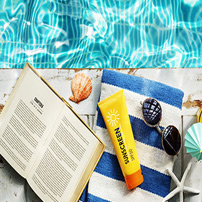Tips for Summertime Sun Safety
May 31, 2017 The Centers for Disease Control and Prevention (CDC) estimate that at least 1 million Americans are diagnosed with a form of skin cancer every year. And, by the time they reach 65-years-old, roughly 40-50% of people will have squamous cell or basal cell carcinoma, two of the most common types of skin cancers. Skin cancer itself is the most common form of cancer that affects Americans, and nearly 10,000 die annually as a result. Even more frightening is that according to the CDC, rates of skin cancer in men and women appear to be increasing each year.
The Centers for Disease Control and Prevention (CDC) estimate that at least 1 million Americans are diagnosed with a form of skin cancer every year. And, by the time they reach 65-years-old, roughly 40-50% of people will have squamous cell or basal cell carcinoma, two of the most common types of skin cancers. Skin cancer itself is the most common form of cancer that affects Americans, and nearly 10,000 die annually as a result. Even more frightening is that according to the CDC, rates of skin cancer in men and women appear to be increasing each year.
Getting sunburn causes damage to skin cells, which then puts them at more of a risk for becoming abnormal or cancerous in the future. In essence, sunburn can basically act as a warning that you may be at risk for having skin problems at some point. Although some people believe that having a tan keeps them more safe from getting a burn, it does not protect them from having the negative effects from UV rays.
Certain risk factors put people at a greater chance of developing skin cancer than others. Some of these risk factors include:
- Having a family history of skin cancer;
- Having lots of moles;
- Working outdoors the majority of the time;
- Being immunocompromised or having a weakened immune system.
There are various other risk factors that can contribute to the development of skin cancer as well, such as having a complete absence of melanin, or colored pigment, being particularly fair-skinned or having certain skin conditions.
Exposure to UV rays is the number one contributing factor behind developing skin cancer, whether or not it is natural sunlight or through use of a tanning bed. As a precaution, the ACS urges people to wear protective clothing as well as sunscreen with at least an SPF of 30 when they are going to be outside. SPF refers to the “sun protection factor” of a sunscreen and its ability to absorb or reflect UV rays.
It is not just during the summer season that protection from UV rays is necessary for overall skin health, although because the days are longer and sunnier it is especially important to use sunscreen. However, the ACS reminds people that it is important to wear sunscreen daily, regardless of what season it is. Another important tip is to make sure to wear “broad-spectrum” protection sunscreen, which guards consumers against UVA and UVB rays. UVA rays penetrate deeply into the skin, leading to premature aging and wrinkles. UVB rays burn the superficial layers of skin, therefore leading to the growth of skin cancer. “Broad spectrum” sunscreens protect from both types of rays.
The number of SPF in a product is actually quite important. There is a difference of 4% in coverage between SPF 15 and SPF 30; SPF 30 filters out at least 97% of UV rays. For products that have a higher SPF than 30 the difference is usually fairly minimal; perhaps 1% at most. So, the safest bet is to use SPF 30 and nothing lower to ensure that you are protecting your skin as best as possible.
The ACS is careful to point out that even if a sunscreen claims that it is “water resistant” it does not mean that it stays intact after swimming or sweating. Products are required by the Food and Drug Administration (FDA) to state how long they are “water resistant,” so it is necessary to remember to carefully reapply sunscreen, especially if it is a very warm day or lots of swimming is involved. The ACS’ official recommendation is to reapply sunscreen every 2 hours, and if you are swimming or sweating a lot, to apply it even more frequently for the best coverage results.
Because there are so many tips for how to take care of your skin, especially in the summer season, we have compiled the remainder of the ACS’ tips below for you to look to for guidance.
- Always use “broad-spectrum” sunscreen with a minimum of SPF 30;
- Reapply sunscreen every 2 hours at least;
- Avoid using tanning beds because they contribute to serious skin damage and skin cancer rates;
- Stay in the shade as much as possible to limit your exposure to UV rays, especially between 10 a.m. and 4 p.m.
It is particularly important for kids to be protected from the sun because getting bad burns as a child is thought to greatly increase the chance of developing skin cancer as an adult. Also, it is easier for children to get sunburns because their skin is more delicate. To see the ACS’ full list of tips for summertime sun safety, please click here.
Philadelphia Personal Injury Lawyers at Galfand Berger, LLP Has Been Helping Injured Victims Since 1947
If you have any questions or concerns, please contact our offices. Our personal injury lawyers in Philadelphia are happy to answer your questions and review your case for free. With offices located in Philadelphia, Bethlehem, Reading and Bethlehem, Galfand Berger, LLP serves clients throughout Pennsylvania and New Jersey. To schedule a consultation, call us at 800-222-8792 or complete our online contact form.
 Google Screened
Google Screened
